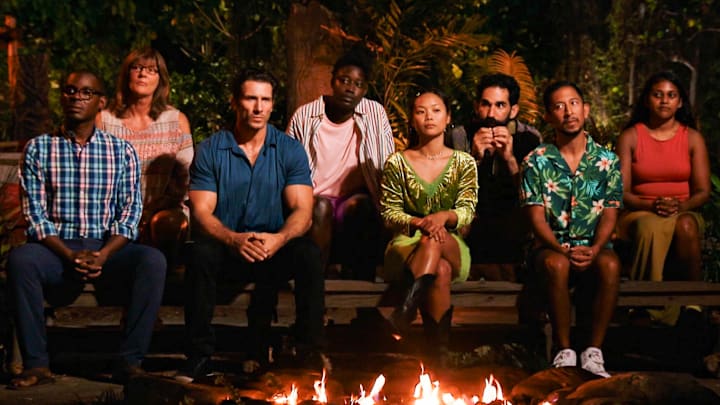One of the many reasons Survivor remains an engaging show for fans 25 years later is because of the players who come in and make each season distinctly unique. The thing that sets Survivor apart is the fact that it's the people who are voted out who decide who wins in the end. And because of this, we never truly know how a season is going to finish since people are unpredictable.
But in an Instagram post this week (below), Survivor 48 contestant Shauhin Davari shared a little insight into what was going through his head as he decided who he was going to vote to win the latest season. And, honestly, I 100% agree with the five categories he established to measure which of his fellow castaways deserved the $1 million.
1. Darkness
Shauhin explains the category to be about using the power of "guilt, intimidation, and shame" to leverage the emotions of others to make the moves you're needing to make for your own game.
And we can definitely look back on this season and see exactly how winner Kyle Fraser used this tactic—not in a bad way, in a necessary way—to further his game. Initiating David Kinne's downward spiral out of the Strong 5 alliance by planting the idea that Shauhin could have an idol. Conversely, convincing Shauhin that David was coming after both of them to get the target off Kamilla Karthigesu's back. And then full circle, convincing Joe Hunter that Shauhin had an idol and was going to try and use it to vote out Eva Erickson. All lies, all deception, but all pertinent to get him and the allies he needed further in the game.
2. Gameplay
This is a pretty straightforward category that fans feel should hold the most importance during the final jury vote. The idea of playing the game for the benefit of your own game, not just for the flashy resume to show the jury at the end. While you need to make big moves in Survivor, you also need purpose behind them, not just the desire to show off that you could make a big move.
Kyle clearly had the best understanding of the game he was playing, the game everyone else was playing, and how to make sure the two worked together smoothly while his still took priority. When I rewatched the season, it was clear that Kyle was always in control—not only of his game, but of the game entirely. And he doubled down on this at Final Tribal Council when he revealed he was the mastermind behind voting out Shauhin.
3. Socialplay
At the end of the day, Survivor is 90% a social game. Even during challenges, castaways spend 24 hours of the day with each other, which establishes relationships from two different perspectives that need to be considered for the long game. Especially since, like I said before, the people you eliminate are the ones you ultimately need to root for you to win. Balancing those relationships and conversations throughout the game is critical for success at the end.
And there's no doubt that Kyle was an extremely social player who figured out how to communicate with the players he needed on his side at the end, like when he got the entire Strong 5 to turn on one of its own in order to save someone presumably on the bottom. And with Survivor 48 being one of the most social-focused games to date, it was a major factor this season to create those bonds that transcended the game without breaking them with internal gameplay. It was a fine line that Kyle walked magnificently.
4. Self-Aware
This is an interesting category that Shauhin explains beautifully. Tying back to that social gameplay, it's important for those bonds built to be genuine, displaying who you are authentically outside of the game, even when making in-game decisions you might not have done back home. And then taking accountability for the deceitful moves you made, not acting like what you did wasn't against what you said you were going to do.
Kyle was 100% accountable in the end and even came forward to take credit for the moves he made that he made others believe they led, namely Joe and Eva thinking they were behind the Shauhin vote. He never once apologized for the moves he made, but rather took ownership of them and leveraged why they needed to be made to get him to the end.
5. Persuasive vs. Defensive Final Tribacl Council
This is my favorite category to hear Shauhin discuss as Survivor's official debate professor. Because it's true that there are Final Tribal Councils where you can tell they're playing defense instead of offense—coming at each other's lack of gameplay instead of establishing why the game they played was the best game in the season.
All three of our finalists this season were very clear that they were going to use their allotted speaking time to explain what they did that deserved to win the game, not put down anyone else's game. And obviously, Kyle did the best job of this, securing the four jury votes he needed to win the game with his brilliant narrative of the overall game and why he was running it the whole time.
Do you think we might start to see this rubric more widely used beginning with season 51? I'd personally love for there to be metrics to determine a player's overall success come Final Tribal Council, but without one, fans are left on their toes until the very end. So who's to say which way is better? There's a reason we all still love Survivor so much after all this time!
